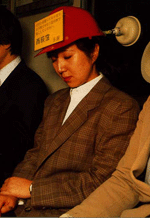: what is chindogu? :
 (from Wikipedia.org) Chindogu is the not-so-ancient Japanese art of inventing ingenious everyday gadgets that, on the face of it, seem like an ideal solution to a particular problem. However, Chindogu has a distinctive feature: anyone actually attempting to use one of these inventions, would find that it causes so many new problems, or such significant social embarrassment, that effectively it has no utility whatsoever. Thus, Chindogu are sometimes described as 'unuseless' - that is, they cannot be regarded as 'useless' in an absolute sense, since they do actually solve a problem; however, in practical terms, they cannot positively be called 'useful'. (from Wikipedia.org) Chindogu is the not-so-ancient Japanese art of inventing ingenious everyday gadgets that, on the face of it, seem like an ideal solution to a particular problem. However, Chindogu has a distinctive feature: anyone actually attempting to use one of these inventions, would find that it causes so many new problems, or such significant social embarrassment, that effectively it has no utility whatsoever. Thus, Chindogu are sometimes described as 'unuseless' - that is, they cannot be regarded as 'useless' in an absolute sense, since they do actually solve a problem; however, in practical terms, they cannot positively be called 'useful'.
Literally translated, 'Chindogu' means weird / unusual ('chin') tool ('dogu'). The term was coined by Kenji Kawakami, a Japanese inventor and writer who first made the idea prominent in a book translated into English, in the mid-nineties, as 101 Unuseless Japanese Inventions: The Art of Chindogu. The popular success of this book prompted a follow-up, 99 More Unuseless Japanese Inventions, which was published a few years later. Together, the books have sold nearly a quarter of a million copies in Japan alone, and have been translated into most of the major world languages. Examples from the books include:
- a combined household duster and cocktail-shaker, for the housewife who wants to reward herself as she's going along;
- the all-day tissue dispenser, which is basically a toilet roll fixed on top of a hat, for hay fever sufferers;
- duster slippers for cats, so they can help out with the housework;
- the all-over plastic bathing costume, to enable people who suffer from hydrophobia to bathe without coming into contact with water.
 There are ten key tenets to bear in mind, if you wish to design a Chindogu. Teams competing in Chindogu Challenge will be evaluated on this criteria and we have listed them here. There are ten key tenets to bear in mind, if you wish to design a Chindogu. Teams competing in Chindogu Challenge will be evaluated on this criteria and we have listed them here.
In spite of the stipulation that Chindogu should not be used for satirical ends, Kawakami himself does appear to regard them as a kind of antidote to consumerism, and the Western obsession with making life as 'easy' as possible. He describes Chindogu as "invention dropouts," anarchically brilliant ideas that have broken free from "the suffocating historical dominance of conservative utility." One might wish to design Chindogu for a number of reasons, for example, to improve one's mental sharpness; to develop them as an art form; or simply to revel in a purely creative act without having to worry about utility or making money.
And then, of course, there is the simple pleasure to be had from a perfectly logical solution that turns out to be perfectly useless.
|
